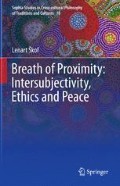Abstract
In this chapter, we summarise some of our previous arguments and propose—also with the help of a series of models—a new and original thought based on our mesocosmic (and essentially intercultural) awareness of breath and the related atmosphere of politics. We propose that thinking the way of peace (and nonviolence) could be reachable only through dynamics of a triadic structure(s), as proposed in the concluding chapter of this book. This thought really originates from Josiah Royce’s original observations on C. S. Peirce’s semiotics and its triadic scheme (intepreter–interpretant–interpretee) from the essay “The Neighbor: Love and Hate”, which concludes this chapter.
Access this chapter
Tax calculation will be finalised at checkout
Purchases are for personal use only
Notes
- 1.
More on possibilities of this “another” Rorty in my Pragmatist Variations on Ethical and Intercultural Life (Škof 2012).
- 2.
Here I would like to pay tribute to the prominent Japanese philosopher Tadashi Ogawa who in his Grund und Grenze des Bewußtseins (2001) beautifully discusses the phenomenology of atmosphere: he views Heidegger’s and Schmitz’s notions (among others) of “Stimmung” and “Atmosphäre” as closely related to the Japanese word “ki,” with its rich meanings, gathered around “air, wind, weather, climate, atmosphere” (94; see chapter “‘Ki’ und eine Phänomenologie der Atmosphäre”). For Ogawa, “[the] atmosphere is nothing but mood, air, wind. What we call the atmosphere is the art of appearing of the world and things. […] The atmosphere is a medium between the so-called subject and the so-called object. Here we can see a close relationship between phenomenology of atmosphere and phenomenology of wind.” (102). Despite some methodological differences, the meaning of the atmosphere with its “ki-” or “wind-nature” in Japanese thought and in Ogawa’s phenomenology is of course closely related to the Indian Vedic sense of “mesocosm” and its usage throughout this book.
- 3.
Braidotti in her Transpositions (2006) defines Luce Irigaray’s thought as a contribution to the so-called new cosmology.
- 4.
On the idea of “expansion” in the ethics see Peter Singer, The Expanding Circle: Ethics, Evolution and Moral Progress (2011).
References
Braidotti, Rosi. 2006. Transpositions. Malden: Polity Press.
Irigaray, Luce. 2000. Democracy Begins Between Two. Trans. K. Anderson. London: Athlone Press.
Ogawa, Tadashi. 2001. Grund und Grenze des Bewußtseins. Würzburg: Königshausen and Neumann.
Rorty, Richard. 2003. Some American uses of Hegel. In Das Interesse des Denkens: Hegel aus heutiger Sicht, ed. W. Welsch and K. Vieweg, 34–46. Paderborn: Wilhelm Fink Verlag.
Sieverding, Judith. 2007. Sensibilität und Solidarität: Skizze einer dialogischen Ethik im Anschluss an Ludwig Feuerbach und Richard Rorty. Münster: Waxmann.
Singer, Peter. 2011. The expanding circle: Ethics, evolution and moral progress. Princeton: Princeton University Press.
Škof, Lenart. 2012. Pragmatist variations on ethical and intercultural life. Lanham: Lexington Books.
Author information
Authors and Affiliations
Rights and permissions
Copyright information
© 2015 Springer Science+Business Media Dordrecht
About this chapter
Cite this chapter
Škof, L. (2015). Ethics of Breath and the Atmosphere of Politics. In: Breath of Proximity: Intersubjectivity, Ethics and Peace. Sophia Studies in Cross-cultural Philosophy of Traditions and Cultures, vol 10. Springer, Dordrecht. https://doi.org/10.1007/978-94-017-9738-2_11
Download citation
DOI: https://doi.org/10.1007/978-94-017-9738-2_11
Published:
Publisher Name: Springer, Dordrecht
Print ISBN: 978-94-017-9737-5
Online ISBN: 978-94-017-9738-2
eBook Packages: Humanities, Social Sciences and LawPhilosophy and Religion (R0)

